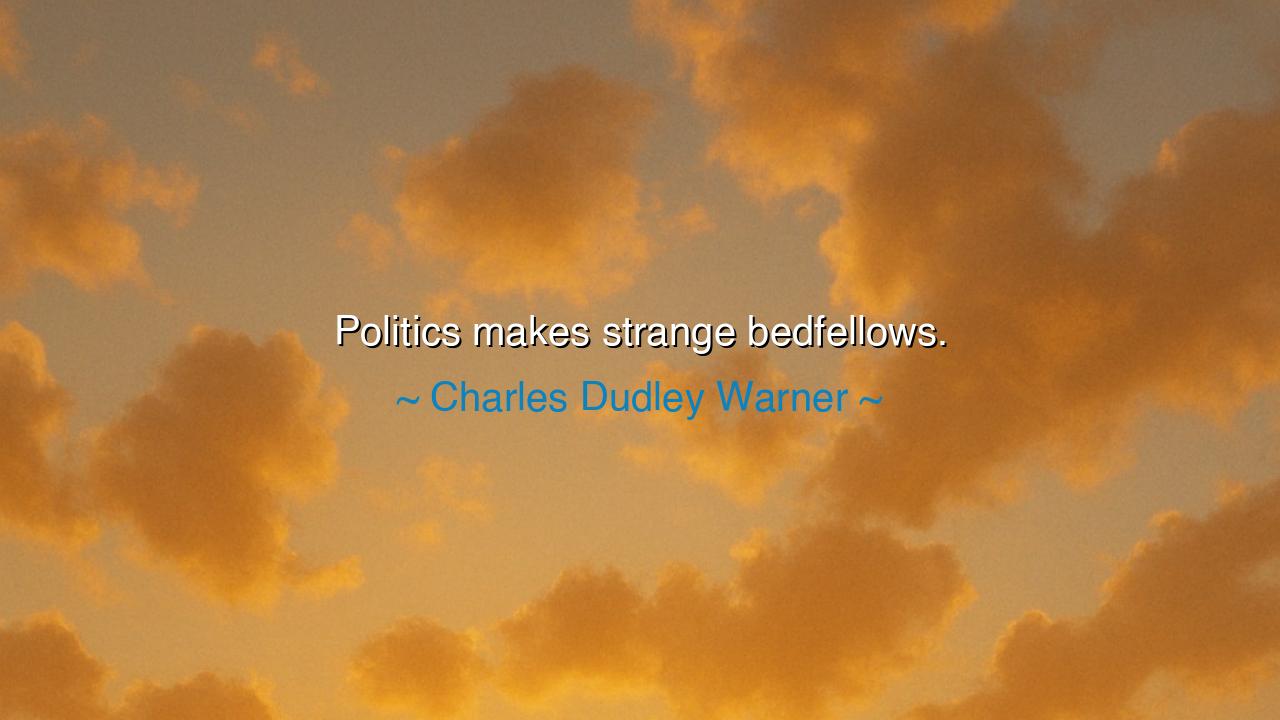
Politics makes strange bedfellows.






Hear, O children of wisdom, the sharp and enduring words of Charles Dudley Warner: “Politics makes strange bedfellows.” In this saying lies the recognition that in the realm of power, alliances are not born from love, friendship, or shared values, but from necessity. Politics, ever shifting like the tide, compels men and women to clasp hands with those they once called enemies, for the sake of survival, advantage, or victory.
For in the pursuit of power, principles are often bent, and foes become partners. The phrase “strange bedfellows” evokes the intimacy of alliance, made stranger by the enmity it replaces. Warner’s observation reveals that politics is not only about ideals but about compromise, and compromise often leads to unions so unlikely that they astonish the world. It is a lesson in both the flexibility and the danger of political life.
History shows this truth with clarity. In the Second World War, Winston Churchill of Britain and Joseph Stalin of the Soviet Union stood worlds apart in ideology—one a defender of democracy, the other a dictator of iron. Yet, faced with the threat of Hitler’s Germany, they became allies, “strange bedfellows” indeed, bound not by trust but by necessity. Their uneasy alliance turned the tide of war, proving Warner’s wisdom that politics shapes unions no heart would ever choose.
Even in ancient times, this truth was evident. The city-states of Greece, divided by rivalry and bloodshed, laid aside their feuds to stand together at Marathon against Persia. Bitter foes became brothers in arms, though when the threat had passed, their unity dissolved into civil war. Thus we see that such alliances are powerful but fragile, lasting only as long as the common need.
Therefore, O seekers of truth, let this lesson endure: in politics, one must be prepared for alliances that defy reason, for necessity is a sharper force than affection. But remember also the danger—that such unions, forged in pragmatism, may not withstand the tests of time or principle. Warner’s words endure as both wisdom and warning: that the path of politics is not straight, and those who walk it must lie beside companions they may not love, but cannot afford to spurn.






KNMai Bui Kim Ngan
Warner’s quote captures the paradoxes of politics, where unlikely collaborations are often seen as a necessary evil. How can we distinguish between genuine compromises and politically convenient alliances? Do strange bedfellows always undermine the integrity of the political process, or can they create solutions that transcend party lines? What happens when political pragmatism overpowers ideological consistency?
TANguyen Tan Anh
It’s intriguing how politics can force people into alliances they would never consider under normal circumstances. How do these odd political partnerships affect public perception of politicians? Do they undermine trust, or do they show that politics is ultimately about finding common ground? Can we really expect lasting results from such partnerships, or are they always doomed to fall apart once the goal is reached?
HLnguyen hai lam
Warner’s quote reminds us that political motives can lead to unexpected partnerships. Does this suggest that the lines between ideology and pragmatism often blur in politics? How much of political decision-making is driven by strategic alliances rather than shared values? Is it possible for these unlikely alliances to form lasting, meaningful solutions, or do they often collapse once the immediate goal is achieved?
LTly tran
The idea that ‘politics makes strange bedfellows’ is a reminder of how compromise is often necessary in politics, even if it means aligning with groups or individuals we don’t fully agree with. Is this a positive or negative aspect of politics? Can these odd coalitions actually help solve problems, or do they end up creating more conflicts in the long run? How should we interpret these alliances?
MAPhi Thi Minh Anh
Politics, according to Warner, can bring together people who might never normally agree on anything. How do these strange partnerships impact the effectiveness of policies and the public’s trust in the political process? Do we view these alliances with skepticism because they often seem insincere, or can they lead to more balanced, if unconventional, solutions to complex issues?